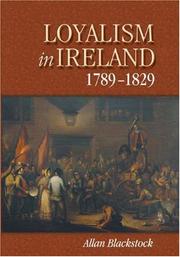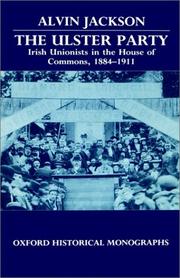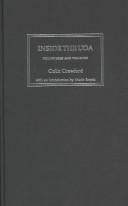| Listing 1 - 6 of 6 |
Sort by
|

ISBN: 1282185616 9786612185618 1846155665 1843833026 Year: 2007 Publisher: Woodbridge ; Rochester, NY : Boydell Press,
Abstract | Keywords | Export | Availability | Bookmark
 Loading...
Loading...Choose an application
- Reference Manager
- EndNote
- RefWorks (Direct export to RefWorks)
Irish loyalism is often neglected in the historical literature or misrepresented as an ideologically rigid and narrowly sectarian foil to emerging nationalism. Yet, in the French Revolutionary wars, loyalism was a recognisable counter-revolutionary ideology with recent parallels in Britain, Europe and America. This book examines the Irish variant in a comparative context and analyses its military, political, cultural and religious dimensions to reveal distinctive strands. A 'liberal' version was receptive to Catholics as loyalists and open to constitutional reform, while an exclusively Protestant version monopolised public expressions of loyalty to politically undermine the campaign for Catholic emancipation. Cultural manifestations of loyalism, including ballads, sermons and Orange parading rituals, are analysed to address questions of popular spontaneity or elite manipulation and changes in Protestant identity. The study reveals that exclusive loyalism needed a physical threat, so the 1828-9 Brunswick Clubs combined militant 1798-style rhetoric with innovative mass petitioning. They failed to prevent emancipation but left a template for Irish Conservatism. ALLAN BLACKSTOCK is a reader at the Academy for Irish Cultural Heritages, School of History and International Affairs at the University of Ulster.
Unionism (Irish politics) --- Loyalism (Irish politics) --- Loyalist movement (Irish politics) --- Unionist movement (Irish politics) --- Irish question --- History --- Ireland --- Politics and government

ISBN: 0198222882 Year: 1989 Publisher: Oxford Clarendon press
Abstract | Keywords | Export | Availability | Bookmark
 Loading...
Loading...Choose an application
- Reference Manager
- EndNote
- RefWorks (Direct export to RefWorks)
Irish question --- Unionism (Irish politics) --- Loyalism (Irish politics) --- Loyalist movement (Irish politics) --- Unionist movement (Irish politics) --- Home rule --- Ulster Unionist Party --- -Great Britain. Parliament. House of Commons --- -Ulster Party --- History --- Ireland --- Northern Ireland --- Irish Free State --- Politics and government --- -Politics and government --- -Politics and government. --- -History --- Great Britain. --- Ulster Party --- House of Commons (Great Britain) --- England and Wales. --- History. --- Politics and government.
Book
ISBN: 1443853585 9781443853583 9781443844208 1443844209 Year: 2013 Publisher: Newcastle upon Tyne : Cambridge Scholars Publishing,
Abstract | Keywords | Export | Availability | Bookmark
 Loading...
Loading...Choose an application
- Reference Manager
- EndNote
- RefWorks (Direct export to RefWorks)
Irish literature --- English literature --- Scottish literature --- Romanticism --- Unionism (Irish politics) --- Scots-Irish in literature. --- Loyalism (Irish politics) --- Loyalist movement (Irish politics) --- Unionist movement (Irish politics) --- Irish question --- Pseudo-romanticism --- Romanticism in literature --- Aesthetics --- Fiction --- Literary movements --- Scots literature --- British literature --- History and criticism. --- Irish authors --- History
Book
ISBN: 1441190546 9781441190543 9781441109033 144110903X 9781441127839 1441127836 1501316338 Year: 2020 Publisher: London, England : London, England : Bloomsbury Academic, Bloomsbury Publishing,
Abstract | Keywords | Export | Availability | Bookmark
 Loading...
Loading...Choose an application
- Reference Manager
- EndNote
- RefWorks (Direct export to RefWorks)
"Challenging traditional narrow views, this unique work proposes to rethink and reinterpret Ulster loyalism from the beginning of the "Troubles" to the present day, by tracing its religious, paramilitary, political, and community influences. The work examines the core values of loyalist communities, the roots of violence, and the shift toward peaceful coexistence with former enemies. Also discussed are the DUP's claims that it represents loyalism's "true voice" along with the complex and varying degrees of commitment to the Crown, the Protestant Faith, and the British governance of Northern Ireland. Lastly, it looks at how cultural expressions of loyalist identity, such as poetry or cartoons, are being used in the (re)construction of a loyalist memory. Written by a leading expert on Ulster loyalism, the work is based on extensive interviews with loyalists and loyalist literature to provide an inside account of the processes of loyalist identity formation and transformation. Drawing on political science, sociology and cultural studies, it will appeal to anyone interested in Irish politics as well as conflict and peace processes."--
Group identity --- Unionism (Irish politics) --- Paramilitary forces --- Forces, Paramilitary --- Paramilitaries --- Armed Forces --- Military art and science --- Loyalism (Irish politics) --- Loyalist movement (Irish politics) --- Unionist movement (Irish politics) --- Irish question --- Collective identity --- Community identity --- Cultural identity --- Social identity --- Identity (Psychology) --- Social psychology --- Collective memory --- Ulster (Northern Ireland and Ireland) --- Northern Ireland --- Cúigh Uladh (Northern Ireland and Ireland) --- Social life and customs. --- Politics and government. --- Political science & theory --- Militias (Paramilitary forces) --- Private militias
Book
ISBN: 9783031234361 Year: 2023 Publisher: Cham Springer Nature Switzerland :Imprint: Palgrave Macmillan
Abstract | Keywords | Export | Availability | Bookmark
 Loading...
Loading...Choose an application
- Reference Manager
- EndNote
- RefWorks (Direct export to RefWorks)
This book presents extensive research into the cinematic representation of the British-identifying Protestant, unionist and loyalist community in Northern Ireland and is the first time such comprehensive analysis has been produced. Gallagher’s research traces the history of the community’s representation in cinema from the emergence of depictions of both nationalist and unionist communities in social-realist dramas in 1980s British and Irish cinema to today, through periods such as those focused on violent paramilitaries in the 1990s and irreverent comedy after the Northern Ireland peace process. The book addresses the perception that the Irish nationalist community has been depicted more frequently and favourably than unionism in films about the period of conflict known as “The Troubles”. Often argued to be the result of an Irish nationalist bias within Hollywood, Gallagher argues that there are other inherent and systemic reasons for this cinematic deficit.
Motion picture plays, European. --- Great Britain—History. --- European Film and TV. --- History of Britain and Ireland. --- European motion picture plays --- European drama --- Motion pictures. --- Nationalism in motion pictures. --- Unionism (Irish politics) --- Northern Ireland --- Politics and government. --- Loyalism (Irish politics) --- Loyalist movement (Irish politics) --- Unionist movement (Irish politics) --- Irish question --- Motion pictures --- Cinema --- Feature films --- Films --- Movies --- Moving-pictures --- Audio-visual materials --- Mass media --- Performing arts --- History and criticism

ISBN: 1849642087 0585488894 9781849642088 9780585488899 0745321070 9780745321073 0745321062 9780745321066 Year: 2003 Publisher: London ; Sterling, Va. : Pluto Press,
Abstract | Keywords | Export | Availability | Bookmark
 Loading...
Loading...Choose an application
- Reference Manager
- EndNote
- RefWorks (Direct export to RefWorks)
This book is a unique insight into the beliefs and political ideology of the Ulster Defence Assocation (UDA) and the Ulster Freedom Fighters (UFF). Featuring interviews with key members of these paramilitary groups, many conducted inside the Maze prison, Colin Crawford presents a thorough analysis of Loyalism and the role that Loyalist paramilitary groups continue to play in Northern Ireland's troubles. He also provides an insider's account of the workings of state-sponsored terrorism. Crawford explores these tensions and assesses the difficulties that the UDA faces in the wake of the Good Friday Agreement. He analyses the Ulster Democratic Party's failure to win seats in the 1998 elections, and he examines the conflict between those who are motivated by the profits of crime and drug trafficking, and those motivated by political ideals. The book makes disturbing and often heartbreaking reading, and it marks an important step forward in understanding the Loyalist position - for it is only through improving our understanding of the experience of all citizens in Northern Ireland that lasting peace can be achieved.
Paramilitary forces --- Political violence --- Unionism (Irish politics) --- Loyalism (Irish politics) --- Loyalist movement (Irish politics) --- Unionist movement (Irish politics) --- Irish question --- Forces, Paramilitary --- Paramilitaries --- Armed Forces --- Military art and science --- History --- Ulster Defence Association --- UDA --- History. --- Northern Ireland --- G.N.I. --- GNI --- Irlande du Nord --- Kita Airurando --- Kitairurando --- Nordirland --- Norlin Airlann --- Pohjois-Irlanti --- Severna Irlandii︠a︡ --- Tuaisceart Éireann --- 北アイルランド --- Politics and government. --- History, Military. --- #SBIB:053.AANKOOP --- #SBIB:324H72 --- #SBIB:328H214 --- #SBIB:94H4 --- Politieke verandering: conflictlijnen, nationalisme/federalisme --- Instellingen en beleid: Verenigd Koninkrijk --- Geschiedenis van Groot-Brittannië en Ierland --- Militias (Paramilitary forces) --- Private militias
| Listing 1 - 6 of 6 |
Sort by
|

 Search
Search Feedback
Feedback About UniCat
About UniCat  Help
Help News
News